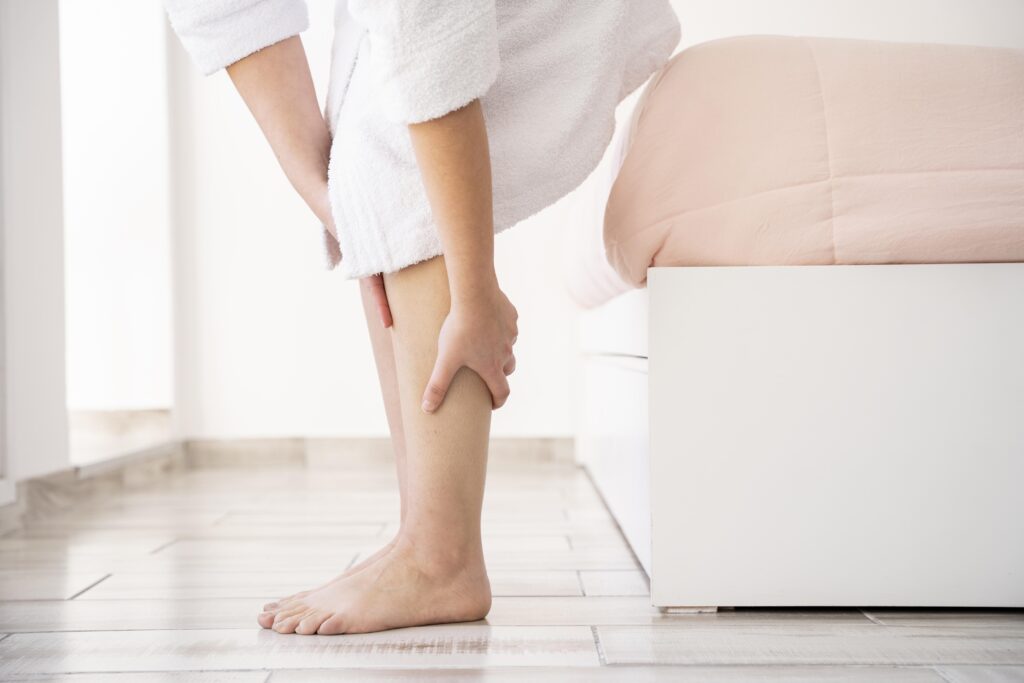Varicose Veins Pain at Night: Causes, Symptoms, and Relief
Varicose veins are a common condition that can cause discomfort and pain, particularly in the legs. One of the more troubling aspects of varicose veins is the pain and discomfort that often worsens at night. This nighttime pain can disrupt sleep and affect overall quality of life, making it difficult to rest and recover. Understanding why varicose veins cause pain at night, recognizing the symptoms, and finding effective relief strategies is essential for managing this condition.

What Are Varicose Veins?
Varicose veins occur when the veins, particularly those in the legs, become enlarged, twisted, and visible just under the skin. This happens because the valves in the veins, which are supposed to keep blood flowing in one direction (toward the heart), become weak or damaged. As a result, blood pools in the veins, causing them to bulge and become varicose.
While varicose veins can develop anywhere, they most commonly affect the legs, ankles, and feet. The condition can lead to discomfort, swelling, and, in severe cases, complications like ulcers or blood clots.
Why Does Varicose Vein Pain Worsen at Night?
Varicose veins are typically more painful at night due to several reasons:
- Blood Pooling During the Day
Throughout the day, especially when standing or sitting for long periods, gravity causes blood to pool in the lower legs. This increases pressure in the varicose veins, causing them to enlarge and become more painful. By the time night falls, this prolonged pressure results in increased discomfort and throbbing pain. - Decreased Movement at Night
During the day, walking and moving around help the calf muscles pump blood back to the heart. However, at night, when you’re at rest and not moving as much, blood circulation slows down. This lack of movement can cause blood to pool in the veins, leading to increased pressure and pain, particularly in the legs. - Elevated Sensitivity to Pain
Pain tends to feel worse at night due to the body’s circadian rhythms. During the night, the body’s perception of pain can increase, making varicose veins more painful. Additionally, since there are fewer distractions at night, individuals may focus more on their discomfort, which amplifies the sensation of pain. - Restless Leg Syndrome (RLS)
Varicose veins are associated with restless leg syndrome, a condition that causes an uncontrollable urge to move the legs, especially when lying down or at rest. RLS can be more noticeable at night, leading to additional discomfort and difficulty falling asleep. Although not directly caused by varicose veins, RLS may be exacerbated by poor circulation related to varicosities. - Night Cramps
People with varicose veins often experience muscle cramps in the legs at night. These cramps, sometimes referred to as “charley horses,” are caused by restricted blood flow and poor circulation. Night cramps can be sudden and painful, and they are more common in individuals with venous insufficiency or varicose veins.

Symptoms of Nighttime Varicose Vein Pain
Varicose vein pain at night can present itself in several ways:
- Aching or Throbbing Pain
This is the most common type of pain associated with varicose veins. The pain typically starts as a dull ache but can progress to more intense throbbing, particularly after a long day of standing or sitting. - Leg Cramps
As mentioned, night cramps are common among people with varicose veins. These cramps usually affect the calf muscles but can also occur in the thighs or feet. The cramps can wake you up in the middle of the night and may last for several minutes. - Heaviness in the Legs
Many individuals with varicose veins describe a sensation of heaviness or tiredness in their legs, particularly at night. This heaviness can feel worse when lying down, as blood may pool in the veins without the aid of muscle contractions to push it back toward the heart. - Burning or Itching Sensation
Varicose veins can cause an itchy or burning feeling in the skin surrounding the affected veins. This sensation can intensify at night, leading to restless sleep and discomfort. - Restless Legs
The sensation of restless legs can make it difficult to lie still, causing a constant need to move or adjust your legs. This can prevent restful sleep and contribute to overall discomfort. - Swelling (Edema)
Swelling in the legs and ankles is another common symptom of varicose veins. This swelling may worsen by the end of the day, causing tightness and discomfort, especially when lying down at night.
How to Alleviate Nighttime Varicose Vein Pain
There are several methods to alleviate the pain and discomfort caused by varicose veins at night. While these approaches can provide temporary relief, they are not a cure for varicose veins. Long-term management may require medical intervention, but the following home remedies and treatments can help manage symptoms.
- Elevate Your Legs
One of the simplest ways to relieve varicose vein pain at night is to elevate your legs while you sleep. Propping your legs up on a pillow or cushion helps improve blood circulation by allowing gravity to assist in blood flow back to the heart. Ideally, your legs should be elevated above the level of your heart for maximum benefit. - Wear Compression Stockings
Compression stockings can help improve circulation by applying gentle pressure to the legs, reducing swelling and discomfort. Wearing compression stockings during the day can help prevent the pooling of blood in the veins, which may reduce pain at night. It’s important to consult with a healthcare provider to determine the right level of compression for your needs. - Stay Active During the Day
Regular physical activity helps improve circulation and reduces the risk of blood pooling in the legs. Low-impact exercises such as walking, swimming, and cycling are excellent options for keeping the leg muscles active and promoting healthy blood flow. Stretching exercises, especially before bed, can also help reduce the risk of nighttime cramps. - Use a Cold Compress
Applying a cold compress to the affected area before bed can help reduce swelling and numb the pain. Cold therapy can constrict blood vessels, which helps decrease blood pooling and reduces inflammation. You can use a cloth-wrapped ice pack for about 15-20 minutes to soothe varicose vein pain. - Massage
Gentle massage of the legs can help stimulate blood flow and alleviate discomfort. Use upward strokes starting from the feet and moving toward the heart to encourage better circulation. Avoid deep or forceful massages, as these can worsen the condition or damage the veins further. - Stay Hydrated and Maintain a Balanced Diet
Proper hydration and a healthy diet rich in fiber and low in salt can reduce swelling and improve vein health. Dehydration and a high-sodium diet can exacerbate water retention, leading to swelling in the legs and worsening varicose vein pain at night. - Avoid Long Periods of Sitting or Standing
If your job requires long periods of sitting or standing, try to take breaks to move around and stretch your legs. Shifting positions frequently and walking periodically can prevent blood from pooling in the veins. - Sleep with a Pillow Between Your Legs
For side sleepers, placing a pillow between your legs can help improve alignment and relieve pressure on the affected veins. This sleeping position can reduce discomfort and prevent aggravating the veins further. - Maintain a Healthy Weight
Excess body weight puts additional pressure on the veins in the legs, increasing the likelihood of varicose veins and associated pain. Maintaining a healthy weight through a balanced diet and regular exercise can reduce the strain on your veins and improve overall blood circulation. - Limit Salt and Alcohol Consumption
Salt and alcohol can both contribute to swelling in the legs, making varicose veins more painful. Reducing your intake of salty foods and alcohol can help manage fluid retention and alleviate the pressure on varicose veins, particularly at night. - Use Over-the-Counter Pain Relief
Nonsteroidal anti-inflammatory drugs (NSAIDs) like ibuprofen can help reduce pain and inflammation associated with varicose veins. While this is not a long-term solution, it can provide temporary relief from discomfort at night. Be sure to follow the recommended dosage and consult with your healthcare provider if you have concerns.

Medical Treatment Options
If nighttime pain from varicose veins persists despite home remedies, medical treatment may be necessary. Several options can help manage varicose veins and reduce symptoms:
- Sclerotherapy
Sclerotherapy involves injecting a solution into the varicose veins, causing them to collapse and eventually fade. This treatment is minimally invasive and effective for smaller varicose veins. - Endovenous Laser Therapy (EVLT)
EVLT uses laser energy to heat and close off the affected vein. This procedure is performed under local anesthesia and is a highly effective option for treating larger varicose veins. - Radiofrequency Ablation
Similar to EVLT, radiofrequency ablation uses heat generated by radiofrequency energy to close off the varicose veins. It is a minimally invasive treatment option that can reduce pain and improve circulation. - Vein Stripping or Phlebectomy
In more severe cases, surgical removal of the affected veins (vein stripping or phlebectomy) may be necessary. These procedures are typically reserved for large, painful varicose veins that do not respond to less invasive treatments. - Varithena®
Varithena is a foam-based treatment injected into the affected vein, which causes the vein to collapse and shrink. This treatment is minimally invasive and can be done in a doctor’s office.
Conclusion
Varicose veins can cause significant discomfort, particularly at night, when pain, cramping, and swelling can interfere with restful sleep. Understanding why varicose veins become more painful at night is crucial for managing symptoms effectively. By incorporating lifestyle changes, home remedies, and medical treatments, individuals with varicose veins can find relief from nighttime discomfort and improve their overall quality of life. If nighttime pain becomes unbearable or persists, it’s important to consult with a healthcare provider to explore medical treatment options.
A perfect Solution Of Varicose Veins Click Here



